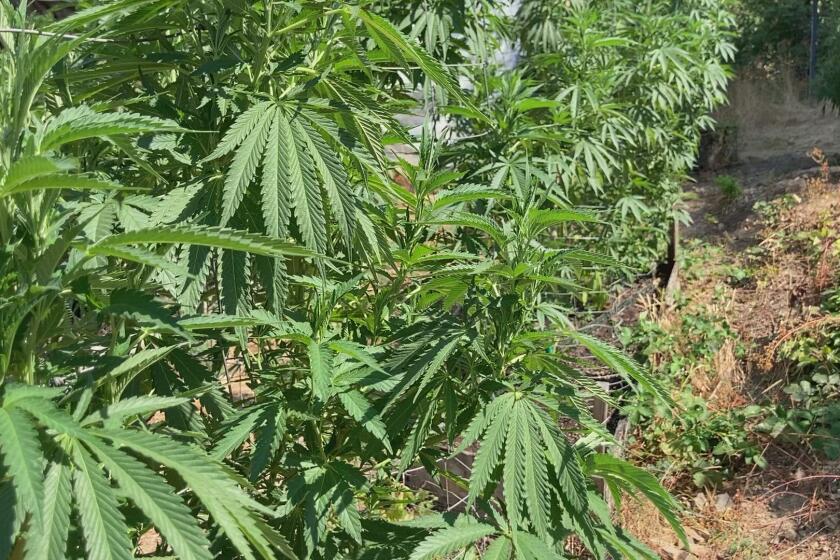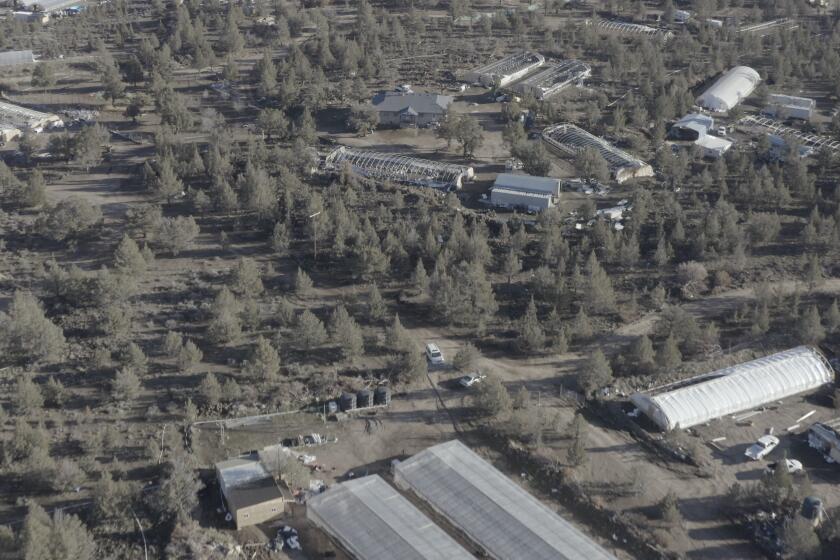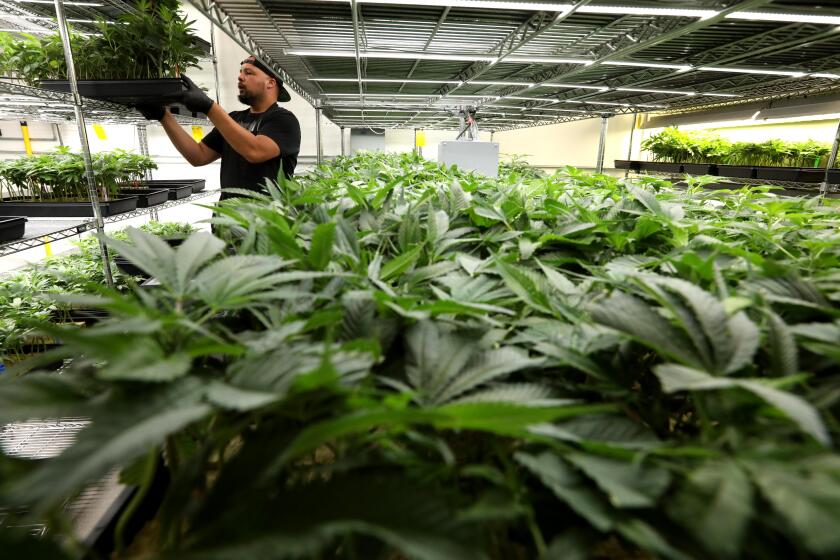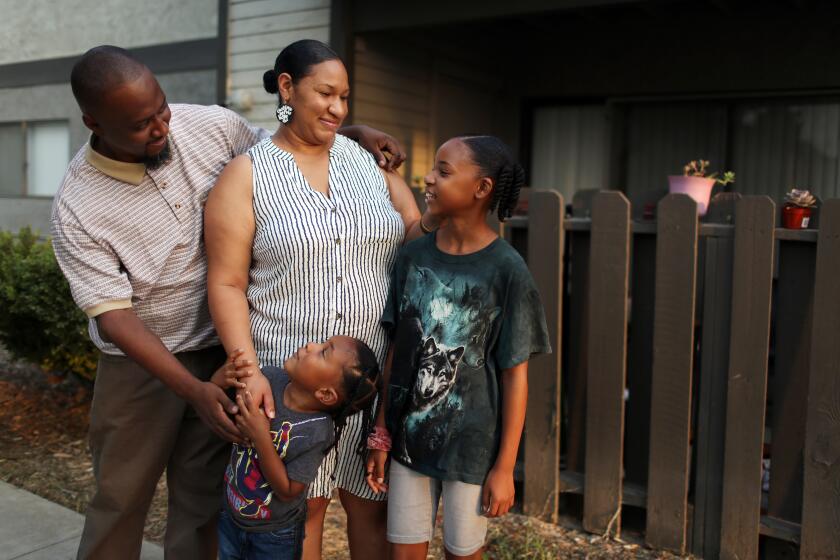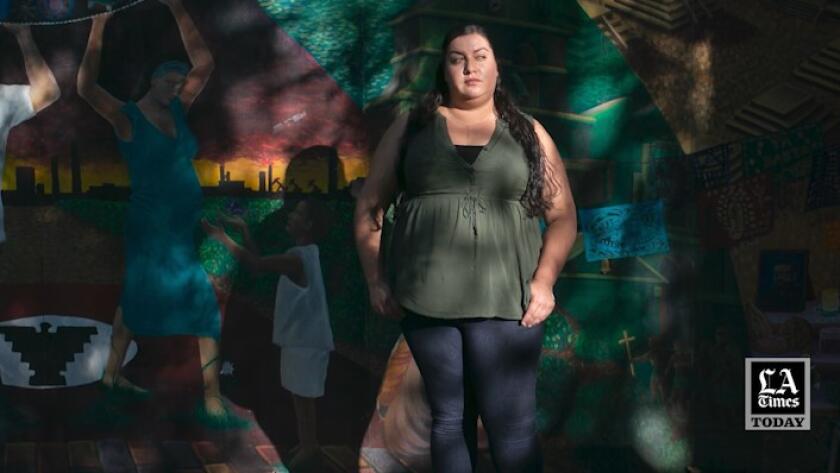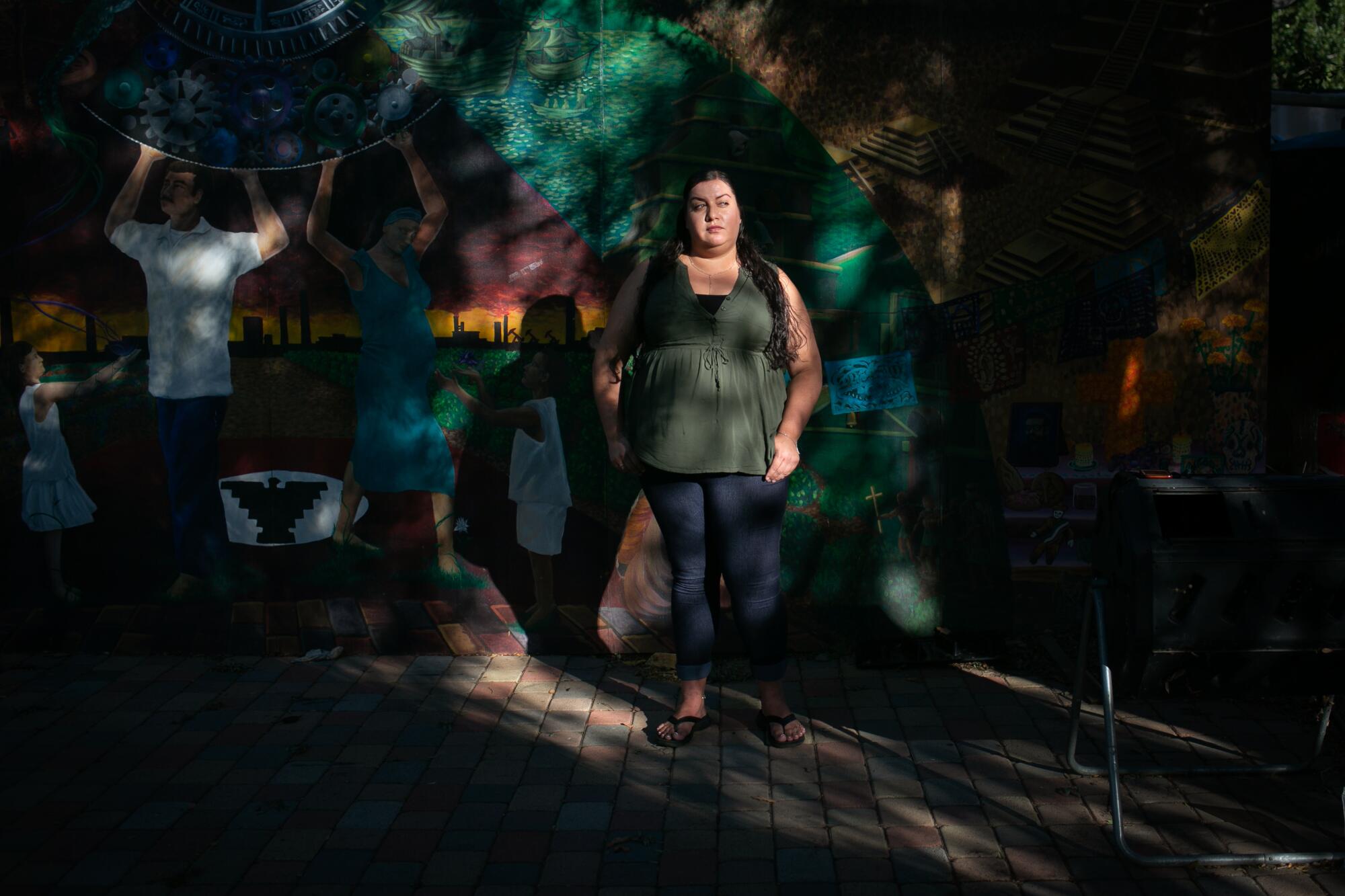
- Share via
Nearly two decades ago, on a high desert road in San Bernardino County, Sara Rodriguez was pulled over and arrested with 10 small packets of cannabis in her car. She was convicted of a felony, possession of the drug for sale, and eventually spent more than two years in prison.
In the years since, Rodriguez, 39, became the first in her family to go to college, and in June graduated from UCLA with a master’s degree in social welfare.
But Rodriguez still has a felony on her record — a potential black mark for employers and the state social work licensing board.
When California voters legalized cannabis for recreational use in 2016, one promise was the creation of a legal pathway through the courts for clearing many past marijuana-related convictions or reducing them to a lesser charge.
It was a step championed by reform advocates, meant to right many of the injustices inflicted by the nation’s war on drugs that was disproportionately waged on poor people and communities of color.
California’s legalization of recreational cannabis in 2016 ushered in a multibillion-dollar industry. But many of the promises of legalization have proved elusive.
But despite a 2018 law intended to speed up and automate the process, tens of thousands of Californians like Rodriguez are still stuck with felonies, misdemeanors and other convictions on their records, a Los Angeles Times investigation found.
I just feel very overwhelmed and stuck. I was under the impression that this would happen automatically, but it’s not.
— Sara Rodriguez
At least 34,000 marijuana records still have not been fully processed by the courts, according to an analysis of data provided by court officials throughout the state. The number was more than twice that in August, before The Times began questioning the slow processing times.
The delays in clearing drug charges can have dire consequences for those seeking employment, professional licensing, housing, loans and in other instances in which background checks are required.
The courts have emerged as the primary bottleneck in a process that has entangled the state Department of Justice and prosecutors’ offices in 58 counties. Although a number of counties have moved aggressively to clear records, many others have moved at a snail’s pace. Some courts — including in Riverside and San Bernardino, where Rodriguez was convicted — haven’t fully processed a single case.
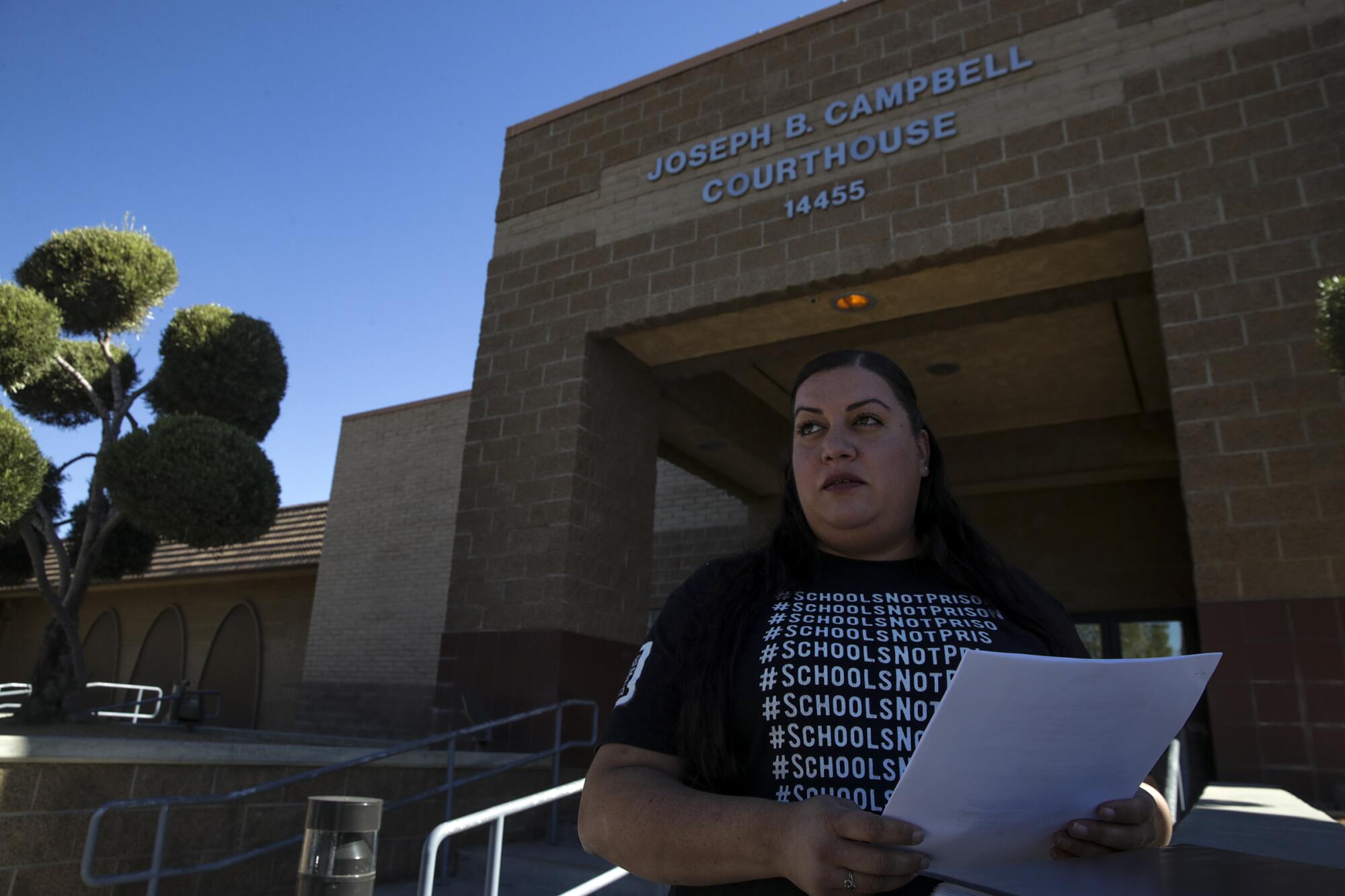
Court officials blamed a combination of factors for delays, including COVID-19, staffing shortages, outdated case management systems, old records that require manual review and technical issues.
California’s legalization of recreational cannabis in 2016 ushered in a multibillion-dollar industry estimated to be the largest legal weed market in the world. But many of the promises of legalization have proved elusive. In a series of occasional stories, we’ll explore the fallout of legal pot in California.
San Bernardino County Superior Court “was severely impacted by COVID-19 with being partially closed for 75 days, and experienced staffing shortages, illnesses and quarantining, along with severe budget reductions,” spokeswoman Julie Van Hook wrote in an email.
But many advocates see the delays as a continuation of a long pattern of failing to address the disparate impact of drug policies on people of color, especially for Black Californians, who for decades have had the highest arrest rates in the state.
“When it’s an issue that is largely impacting Black people, we move slowly on getting things done,” said Eliana Green, an attorney at the Hood Incubator, which advocates for racial and economic equity in the cannabis industry.
California Atty. Gen. Rob Bonta, who wrote the law to clear criminal records while he served in the state Legislature, acknowledged problems with its implementation.

“It’s not acceptable. It’s taking too long,” Bonta told The Times in an interview.
About 117,000 Californians have gotten legal relief for their marijuana convictions, Bonta said, but the state has faced significant challenges, particularly given the lack of a centralized statewide records system.
“What a shame!” said Felicia Carbajal, executive director of the Social Impact Center in Los Angeles. “The community deserves better than the half-measures we’re seeing on this.”
Many public defenders and district attorneys shared similar concerns that the state’s effort lacked the necessary resources and technology to succeed.
It’s not acceptable. It’s taking too long.
— California Atty. Gen. Rob Bonta
Yolo County Dist. Atty. Jeff Reisig described the court record systems in California as “totally screwed up.”
“There’s no coordination. Counties don’t communicate with one another. They barely communicate with DOJ,” Reisig said. “You have 58 counties in California and each one is like its own state.”
The 2018 law — Assembly Bill 1793 — was supposed to clear past cannabis convictions en masse, doing away with the need to file individual court petitions — an onerous process that few Californians undertook, whether for lack of resources or awareness it was an option. The burden was placed on the state to automate the process of identifying eligible cases, updating records, and dismissing and sealing many of them so they do not appear on background checks.
The law was the first in the nation to offer automatic record clearance for marijuana convictions. At least six other states looked to California and modeled similar legislation.
“The vision,” said Bonta, was “that the government should have a primary and central role in delivering the existing rights to people, instead of making them go fight for it and find it and take 10 different steps.”
The Justice Department sent district attorneys 191,055 potentially eligible marijuana cases for review. Their deadline was July 1, 2020, to send cases to the courts, and most counties complied.
But the law didn’t give California’s 58 superior courts a deadline to complete their end: updating case records and transmitting them back to the Justice Department, which maintains the statewide criminal history database and responds to background checks.
The Times collected data from more than three dozen superior courts around the state and found many counties are moving slowly. Riverside County Superior Court has not fully processed any of its 21,000 cases.
Many courts were at varying stages: For example, Alameda County has processed 58% of cases, and Santa Cruz County 39%. Kern County is at 18%.
Kern County officials cited technical glitches for the delay in getting cases to the Department of Justice. Santa Cruz officials said their progress had stalled because the court was awaiting a software fix from its record management system vendor.
Some counties have fared better. Pandemic notwithstanding, Santa Clara finished its 11,500 cases in April 2020. Los Angeles finished processing 66,000 cases in late 2021.
The delays are not for lack of funding. The courts got $16.83 million from the state budget to pay for the costs of processing records, such as staffing and development of information technology. The Judicial Council of California, which oversees the superior courts, distributed the money among the counties, but a representative said the agency does not track how the funds are used or how much progress the courts have made.
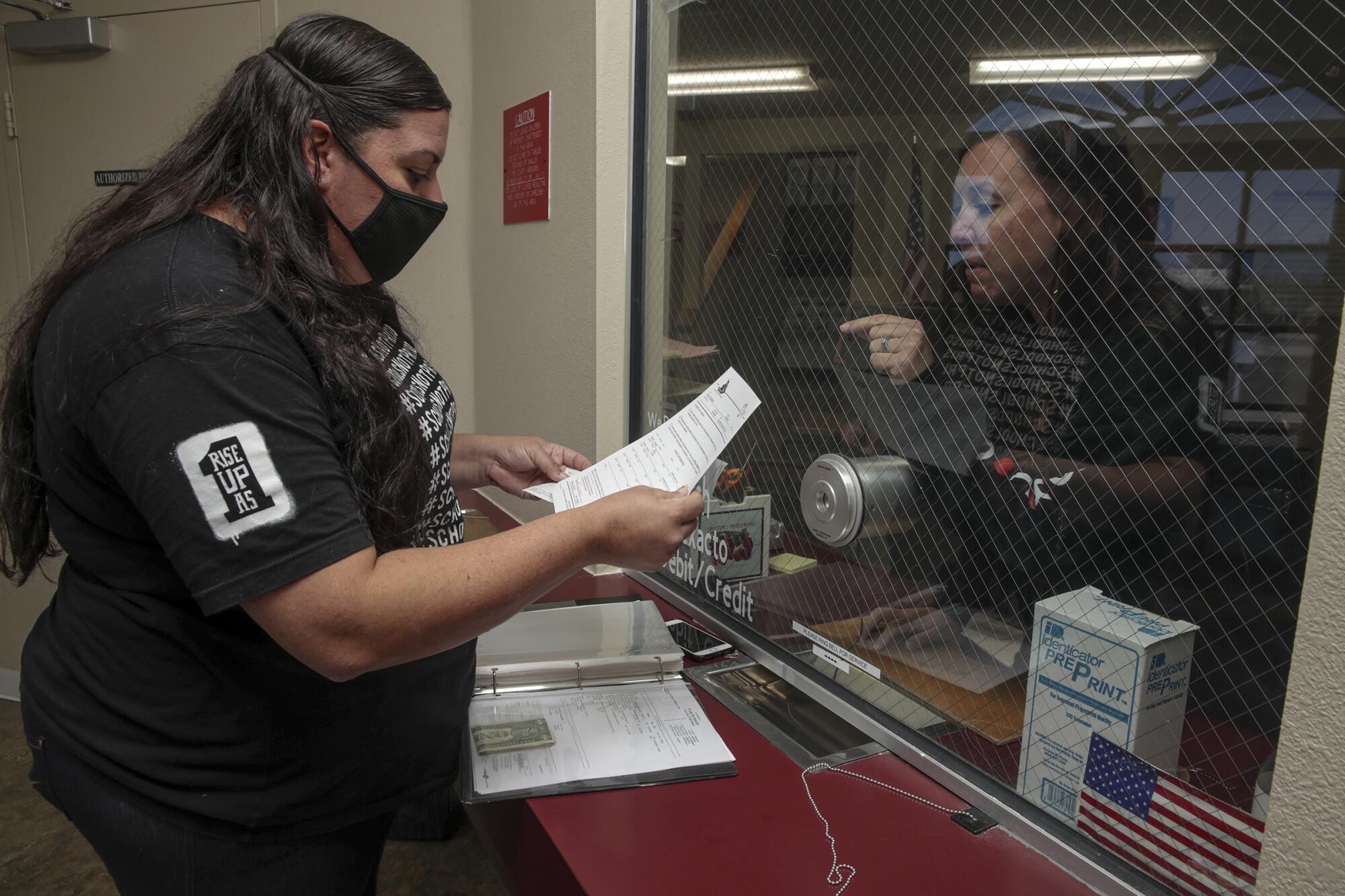
The Inland Empire has among the lowest clearance rates in the state.
In San Bernardino County, Rodriguez’s felony conviction was one of about 5,400 cannabis cases that were essentially gathering dust. After questions from The Times, the court began reviewing records at the end of 2021, but none of the cases have been completed, a representative confirmed.
Riverside County Superior Court Chief Deputy of Operations Carrie Snuggs pointed to “overall backlogs related to the pandemic,” technical issues and inadequate staffing.
Illegal cannabis farms are engulfing parts of California and exploiting farmworkers who labor in squalid, deadly conditions, a Times investigation finds.
Authorities there had finished reviewing about 3,600 misdemeanors and infractions, but all 17,400 felonies remained. And the court hadn’t sent even the misdemeanors and infractions to the Department of Justice because of an apparent misunderstanding of directions, The Times found. (After questions from The Times, the Justice Department said it was assisting the court in its first transmission of cases.)
“It’s not a priority. This is something that has been mandated by law and they’re still not doing it,” said Shaun LeFlore, an organizer in Riverside with the group All of Us or None, which advocates for formerly incarcerated people. “For those 21,000 people in Riverside or 5,400 people in San Bernardino, they deserve to have their life back.”
When Rodriguez got out of prison, “a felony really felt like dream-crushing,” she said. She was turned down for jobs and, if she hadn’t lived with her mom, probably would have been turned down for housing. Many communities in California have “crime-free housing” policies, which often pressure landlords to exclude tenants with criminal backgrounds. And people can be denied public housing or Section 8 vouchers for drug convictions.
But Rodriguez found a place in higher education and attended Cal Poly Pomona, where she joined a program called Project Rebound, a support network for formerly incarcerated students at Cal State schools. She and her friends in the group helped one another navigate housing and jobs, leading her to pursue a graduate degree at UCLA.
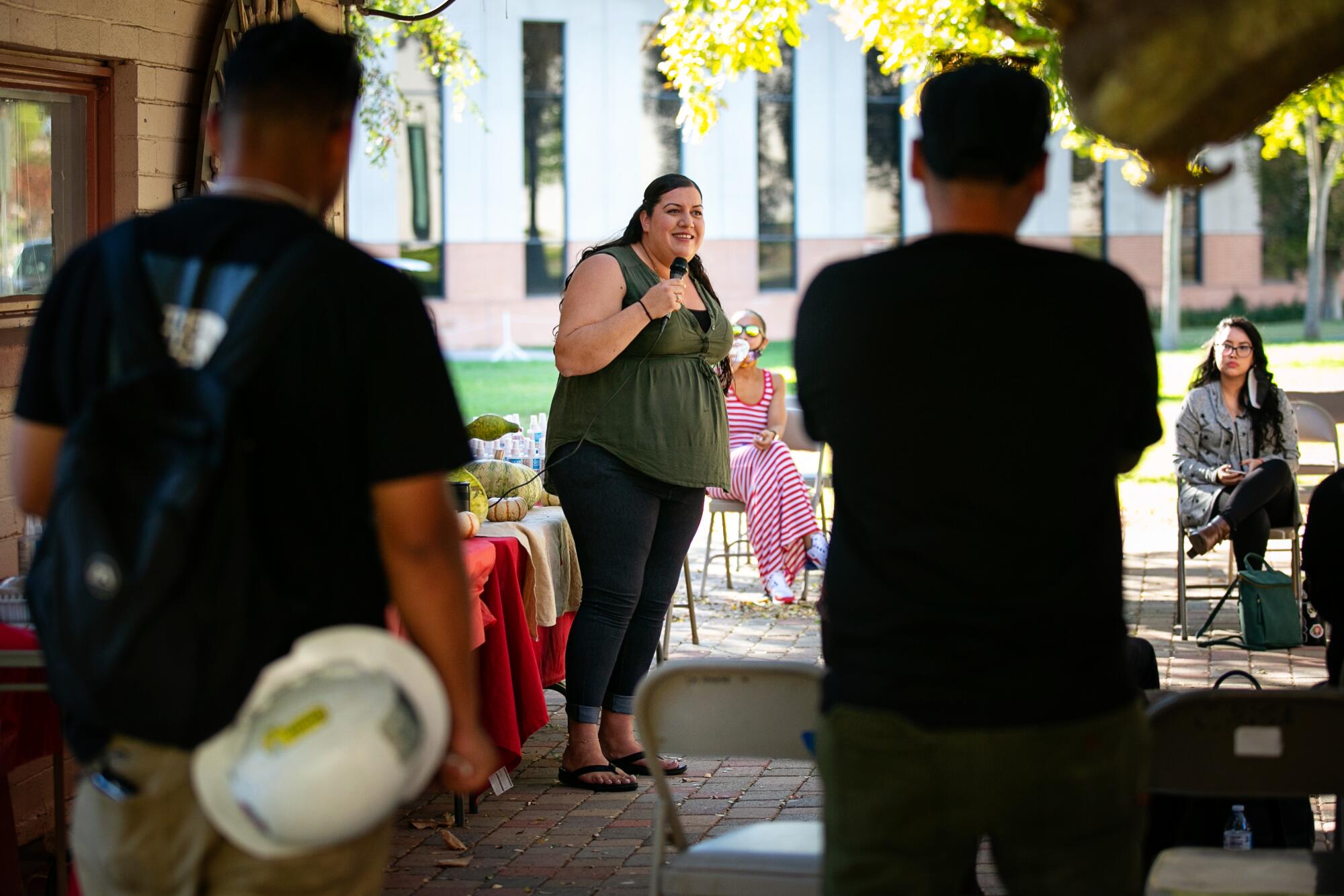
Yet she worried that her career could hit roadblocks until her felony conviction was downgraded to a misdemeanor.
“I just feel very overwhelmed and stuck,” Rodriguez said. “I was under the impression that this would happen automatically, but it’s not.”
Under another recent state law, the social work licensing board at least in theory can’t deny her application based on her conviction alone. But reality could be a different matter, she said, and a misdemeanor looks a lot better than a felony.
It creates a permanent underclass. By not purging marijuana records, we’re helping to foster poverty [for Black and brown people].
— Vonya Quarles, executive director of Starting Over
Many advocates said the lag in clearing records hits Black and Latino communities especially hard. While national studies show marijuana usage is roughly the same among white, Black and Latino people, in 2015 in California, the marijuana arrest rates for Latinos were 1.4 times higher than white people, and Black Californians were arrested at 3 ½ times the rate of white people, according to a 2016 report by Drug Policy Alliance. That year, Black people were nearly five times more likely than white people to be arrested for a marijuana felony, the report found.
“It creates a permanent underclass. By not purging marijuana records, we’re helping to foster poverty” for Black and brown people, said attorney Vonya Quarles, executive director of Starting Over, which provides services for formerly incarcerated people in the Inland Empire and Los Angeles. “The types of jobs that are available to people with felony convictions are not as good as the types of jobs that are available to people without them.”
Under AB 1793, which applied retroactively for marijuana convictions based on possession, sale, cultivation and transportation, prosecutors had a great deal of discretion: They could challenge cases identified by the Justice Department and were free to add more names to the list of those who qualified for relief. Many prosecutors downgraded felonies to misdemeanors, and the misdemeanors and infractions — which were no longer illegal under Proposition 64 — they dismissed and sealed.
In 1996, California voters legalized medical marijuana. Its influence continues to be felt today.
Sealing a case means that the conviction is wiped from the public record. In that sense, it’s “cleared.”
In Los Angeles, then-Dist. Atty. Jackie Lacey, facing a reform-minded challenger in the November 2020 election, announced she would petition the court to seal all 66,000 marijuana cases.
L.A. County Superior Court completed updating its records and sent the bulk of its cases to the Department of Justice in April, a representative said.
Statewide, the Justice Department has yet to seal about 10,000 cases, and 4,000 of those convictions are from L.A.
But the department has developed ways to circumvent some potential problems, officials said. For example, some background checks that go through the department — such as those for public housing and employment — are flagged to expedite sealing marijuana convictions if they appear.
Los Angeles County Deputy Public Defender Nick Stewart-Oaten said the courts, the Department of Justice and the police have yet to fully synchronize information. He said he is aware of at least two cases in which people were jailed and falsely accused of felonies because their marijuana convictions hadn’t been updated at either the state or local level.
This fall, Lacey’s successor, George Gascón, announced that his office had unearthed an additional 58,000 cannabis convictions and would petition that they be sealed.
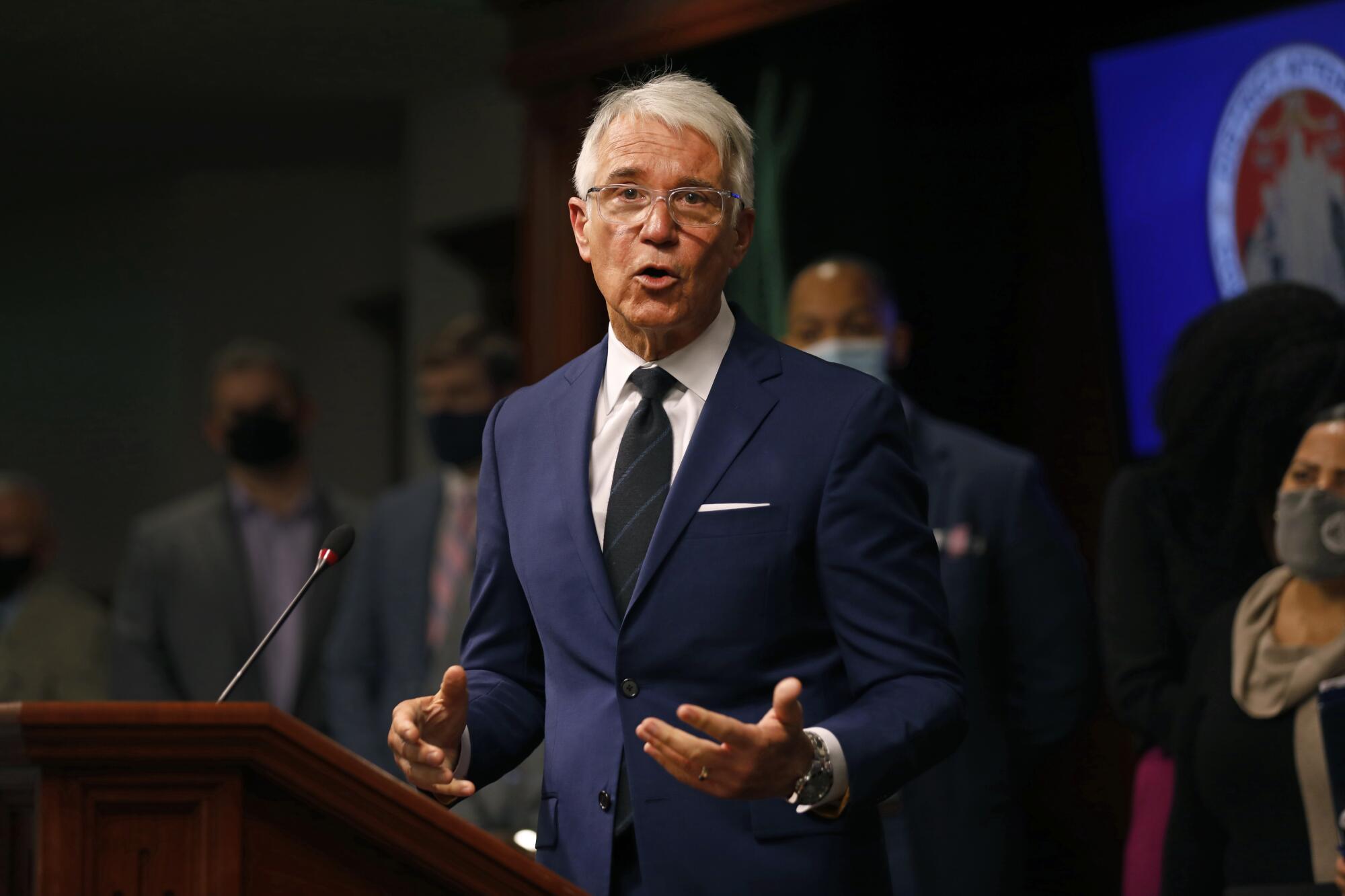
Alameda County, which includes Oakland, didn’t send its first batch of cases to the Department of Justice until June 2021, court officials said. Only 4,718 court records have been updated and transmitted so far, with 3,438 cases remaining.
Alameda Court Executive Officer Chad Finke said the court has been short-staffed during the pandemic and hiring has been difficult. The remaining cases require manual review, as many of them are old or not in the court’s electronic record system, Finke said.
“Meanwhile, those staff that we do have in our Criminal division have other work that they must perform every day to ensure that defendants’ rights are protected, deadlines are met, etc.,” Finke wrote in an email.
Nearly 2,000 communities in the U.S. and elsewhere encourage landlords to evict or exclude tenants who have had some interaction with law enforcement.
One of the languishing marijuana cases in Alameda belonged to Justin, who asked to be identified by his nickname to avoid questions from his employer.
He was arrested at 18 after he said cops caught him carrying just over an ounce of weed in a Mason jar. In 2007, he was convicted of felony marijuana possession and sentenced to three years of probation.
After probation, the court reduced Justin’s felony to a misdemeanor. Until recently, he had no idea laws were on the books that should have wiped his record clean.
He worried his criminal record would get in the way of securing a visa to work abroad. Eventually, he connected with an attorney at Oakland-based Root & Rebound, who helped him petition the court. The process took about four months, and in mid-October his record was cleared.
“There was a certain disservice being done,” Justin, 33, said. “Not only was it not automatic, there was never any transparency about the process.”
It took San Diego County Superior Court until the end of September — more than a year and a half — to finish reviewing 35,662 records. Nearly 26,000 of those convictions were felonies. During the pandemic, creating virtual courtrooms, electronic filing and livestreaming hearings “have taken priority and resources,” court spokeswoman Julie Myres said in an email.
But by mid-November, none of the cases had been sent to the Department of Justice to update its criminal history database, officials said. Since then, the department said it assisted San Diego on its first successful transmission. (San Diego recently sent 25,550 cases to the Justice Department, officials said.)
San Diego received $2.196 million from the state in anticipation of requiring extensive clerical resources for the marijuana records, but the court only spent about $28,000, according to Judicial Council data. The court created computer programs that nearly eliminated the need for clerks, Myres said, and the leftover money will be returned to the state.
In December, the state Department of Justice sent out a bulletin imploring prosecutors and courts to speed up.
“We urge prosecuting agencies and courts to prioritize implementation of the cannabis resentencing process … so Californians can promptly obtain the relief to which they are entitled under the law,” the bulletin said.
Bonta said his agency is reaching out to the courts to offer resources and support to “make sure there’s clarity on the system.”
“We’re learning from this how better systems can lead ... to real on-the-ground impacts for real people,” Bonta said. “It’s an important lesson and we need to do better.”

Meanwhile, Rodriguez recently contacted the public defender’s office in San Bernardino County to begin filing a petition on her own. They warned her the process would take six to eight months.
The social work licensing board application had an entire section asking her to explain her felony. Knowing the long-ago conviction will still show up in a mandatory background check, she drafted a long narrative about her marijuana arrest, her prison time, her rehabilitation and the many awards and achievements she’s racked up since.
“It’s a lot of work always having to explain myself,” Rodriguez said. Eventually, she hoped, she wouldn’t have to.
- Share via
Watch L.A. Times Today at 7 p.m. on Spectrum News 1 on Channel 1 or live stream on the Spectrum News App. Palos Verdes Peninsula and Orange County viewers can watch on Cox Systems on channel 99.
More to Read
Sign up for Essential California
The most important California stories and recommendations in your inbox every morning.
You may occasionally receive promotional content from the Los Angeles Times.
